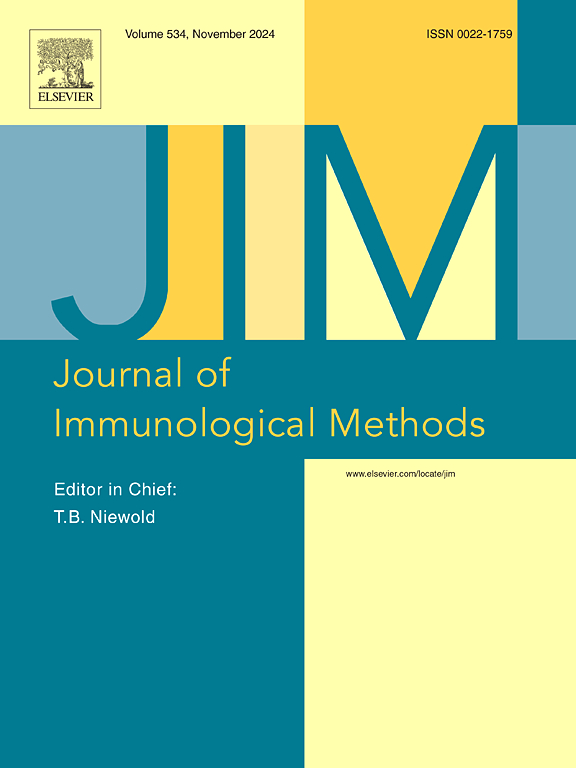Epitope profiling of cow's milk allergen-specific antibodies with determining IgE content in epitopes-ALL, a 14-epitopes mixture
IF 1.6
4区 医学
Q4 BIOCHEMICAL RESEARCH METHODS
引用次数: 0
Abstract
Allergen-specific antibodies (Abs), IgE, and IgG4 increase during the early phase of oral immunotherapy (OIT) of allergen food in patients; subsequently, IgE levels decrease and specific IgG4 levels increase after successful OIT treatment. The detailed profile of these Abs during OIT remains largely unclear. We developed a diagnostic tool to assess the OIT efficacy and extent of responsiveness based on a profiling method by identifying epitopes recognized by the Ab classes of IgE or IgG4.
A peptide microarray followed by microplate analysis using synthetic peptides was used to identify 14 epitopes widely recognized by IgE and/or IgG4 in the serum samples of patients with OIT among the amino acid sequences of five major cow's milk allergens. The set of defined 14 epitopes clarified different epitope profiles of allergen-specific IgE and IgG4 in each patient's serum samples. Moreover, the total signal of Abs recognizing all 14 epitopes was equal to the sum of all individual epitope-specific Abs. It was further observed that the quantitative value of IgE concentrations of 14 epitopes-ALL correlated with the ImmunoCAP IgE value.
These findings strongly imply that the quantity of IgE and IgG4 recognizing epitopes-ALL may easily be used to measure allergy severity. To investigate this potential, we developed an immunochromatographic method that can detect IgE and IgG4 levels in patient samples.
This study clearly demonstrated the usefulness of the defined 14 epitopes and their mixture, “epitopes-ALL,” and that the simple and reliable methods of immunochromatography and microplate analyses demonstrating the epitope profile of allergen-specific Abs are applicable for diagnostic use at multiple disease stages and the OIT-treatment course in patients with cow's milk allergy.
牛乳过敏原特异性抗体表位谱分析,确定表位谱-ALL(14 个表位谱混合物)中的 IgE 含量。
过敏原特异性抗体(Abs)、IgE 和 IgG4 在患者口服过敏原食物免疫疗法(OIT)的早期阶段会增加;随后,在 OIT 治疗成功后,IgE 水平会降低,特异性 IgG4 水平会增加。OIT 期间这些 Abs 的详细情况在很大程度上仍不清楚。我们开发了一种诊断工具,通过识别 IgE 或 IgG4 类抗体识别的表位,以剖析法为基础评估 OIT 的疗效和反应程度。在使用合成肽进行微孔板分析后,我们使用肽芯片从五种主要牛奶过敏原的氨基酸序列中识别出了 OIT 患者血清样本中 IgE 和/或 IgG4 广泛识别的 14 个表位。这 14 个表位明确了每位患者血清样本中过敏原特异性 IgE 和 IgG4 的不同表位特征。此外,识别所有 14 个表位的抗体的总信号等于所有单个表位特异性抗体的总和。进一步观察发现,14 个表位-ALL 的 IgE 浓度定量值与 ImmunoCAP IgE 值相关。这些发现有力地表明,识别表位-ALL 的 IgE 和 IgG4 的数量很容易用来衡量过敏的严重程度。为了研究这一潜力,我们开发了一种免疫层析方法,可以检测患者样本中的 IgE 和 IgG4 水平。这项研究清楚地证明了已定义的 14 个表位及其混合物 "表位-ALL "的实用性,而且证明过敏原特异性 Abs 表位谱的免疫层析法和微孔板分析法简单可靠,可用于牛奶过敏患者多个疾病阶段和 OIT 治疗过程的诊断。
本文章由计算机程序翻译,如有差异,请以英文原文为准。
求助全文
约1分钟内获得全文
求助全文
来源期刊
CiteScore
4.10
自引率
0.00%
发文量
120
审稿时长
3 months
期刊介绍:
The Journal of Immunological Methods is devoted to covering techniques for: (1) Quantitating and detecting antibodies and/or antigens. (2) Purifying immunoglobulins, lymphokines and other molecules of the immune system. (3) Isolating antigens and other substances important in immunological processes. (4) Labelling antigens and antibodies. (5) Localizing antigens and/or antibodies in tissues and cells. (6) Detecting, and fractionating immunocompetent cells. (7) Assaying for cellular immunity. (8) Documenting cell-cell interactions. (9) Initiating immunity and unresponsiveness. (10) Transplanting tissues. (11) Studying items closely related to immunity such as complement, reticuloendothelial system and others. (12) Molecular techniques for studying immune cells and their receptors. (13) Imaging of the immune system. (14) Methods for production or their fragments in eukaryotic and prokaryotic cells.
In addition the journal will publish articles on novel methods for analysing the organization, structure and expression of genes for immunologically important molecules such as immunoglobulins, T cell receptors and accessory molecules involved in antigen recognition, processing and presentation. Submitted full length manuscripts should describe new methods of broad applicability to immunology and not simply the application of an established method to a particular substance - although papers describing such applications may be considered for publication as a short Technical Note. Review articles will also be published by the Journal of Immunological Methods. In general these manuscripts are by solicitation however anyone interested in submitting a review can contact the Reviews Editor and provide an outline of the proposed review.

 求助内容:
求助内容: 应助结果提醒方式:
应助结果提醒方式:


